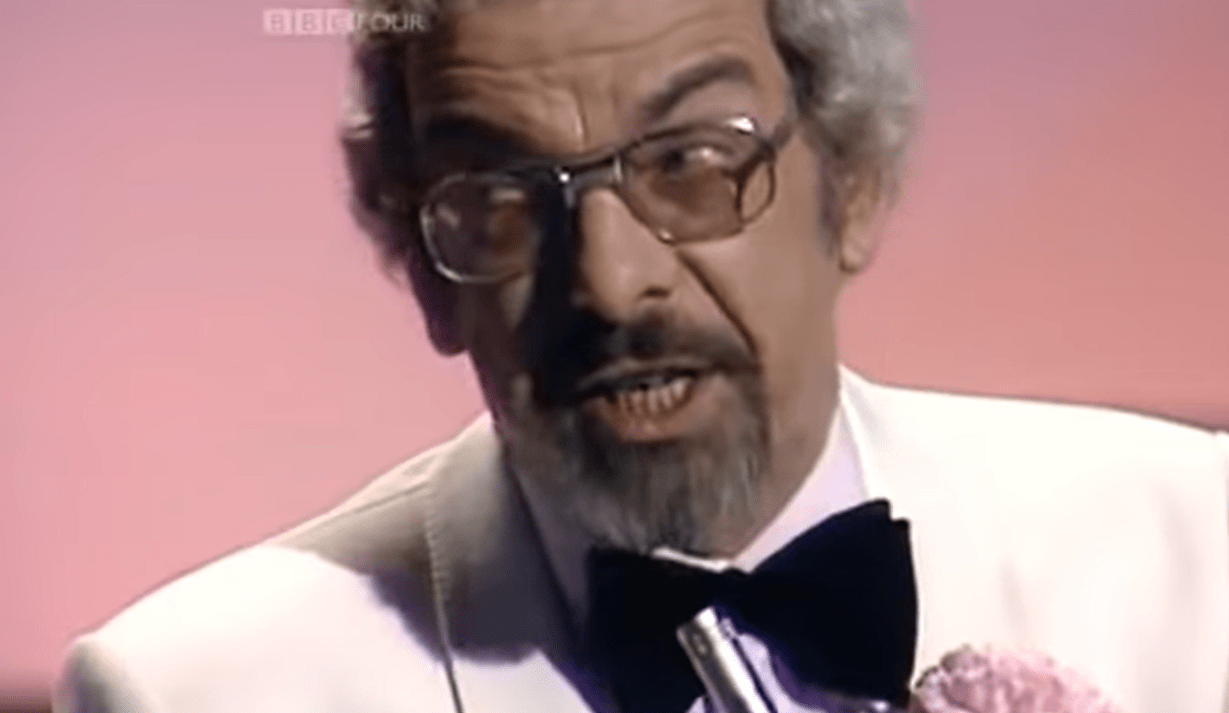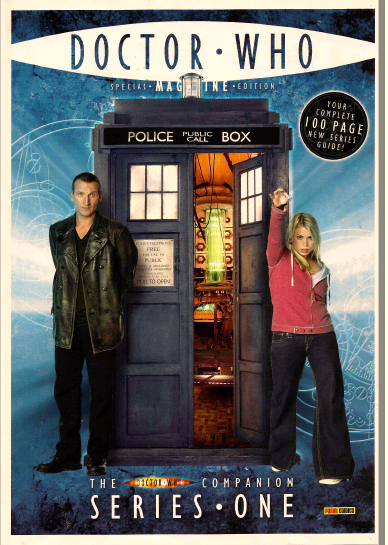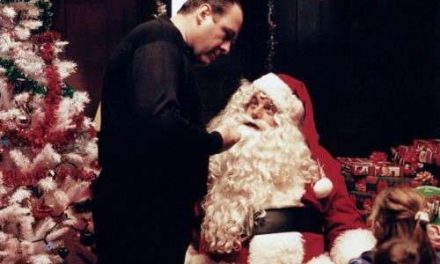Sometimes… just sometimes… you can go back…
Oh, I’m not talking here about something as lazy as nostalgia. We’ve debated the potential dangers of that before – of that attempt to wind time back to a point that you recall as being some idyllic perfect moment. No, what I’m thinking about here is perspective and experience… and how they form enjoyment.
I suspect that in academia as in whatever-it-is-that-I-actually-do, there is a strange process that takes a thing – a subject, a focus – and changes it into something else. Be it fanzines or theses, the trigger point is most likely to be something that you initially engage with, adore, celebrate and feel is brilliant and important… and because of that you want to know more about it… and also to expound upon its qualities so that others can also adore, celebrate and feel its brilliance and importance.
So you take your favourite series or favourite film or favourite play and set to work. Researching, analysing, deconstructing, checking, studying, dismantling, cataloguing, listing, grouping, comparing, summarising, concluding… all the elements that you need to invest time in to prove an argument or convey information in some end product. A documentary. A paper. A book. A fanzine article. A podcast.
And it’s a tricky thing because it’s a means to an end that can be quite enjoyable and can be quite satisfying… but it can have consequences.
I keep recalling how on some popular culture documentary or other regarding a historic humourist or a seminal sitcom, legendary comedy ace Barry Cryer sagely commented: “Analysing comedy is like dissecting a frog. Nobody laughs and the frog dies.”
Possibly for the bigger projects – the books, the documentaries, the doctoral papers – it’s less of a dissection… more of a big game hunt. Days, weeks, months spent stalking the prey, studying it, watching it, analysing it, understanding it, until you know your subject inside out and the moment is right and you have it perfectly in your sights – BAM! – you’ve taken your shot. And now you have your trophy. The favourite series or favourite film or favourite play is now a Thing, your Thing… stuffed and mounted on the wall. Or, more likely, now sitting on the shelf with the other books or journals or DVDs having achieved its purpose and with a ‘Job Done’ tick in the box alongside it.
And – after that moment when the warm self-glow of smug achievement has cooled – how often is it that we return to that favourite series of favourite film or favourite play? Because we now know every line, every camera shot, every location, every music cue… and the process has given us what we want, but sort of reduced something that we did watch regularly – y’know, for fun – to its base constituent particles. Just the components… without the fun, without the amazement.
This is a process that my wife and I have been through many, many times in the last two decades, Now, we have been lucky. Very lucky. A number of publishers have allowed us the opportunity to have a deep dive and immerse ourselves in some of our favourite series. In particular Doctor Who (1963-). It’s a show that we’ve both been watching since we were very young, and when we moved into together around the turn of the century and discovered that between us we had a 98% full run of the show on VHS, we decided to experience the show from start to finish – from 1963 pilot episode to 1996 TV movie. One episode, over the evening meal, weekdays… Nobody paying us, no book, no blog (whatever those are). Just for fun.
And it was the most fun we’d had with the series in years. I mean, no film or programme will ever be better than its first viewing – even if it was on a degraded nth generation Betamax tape or warping with distortion on the fringes of reception from a neighbouring TV region – but this sequential viewing was the next best thing.
A few years later, it turned out that there was some more Doctor Who to watch after all. And, what’s more, the publishers of Panini’s Doctor Who Magazine ask us if we would like to write about it? In exchange for money. One catch though – it had to be written about on very tight timescales.
Let me explain…
A series of Doctor Who was generally thirteen episodes aired over thirteen weeks on thirteen Saturdays. We needed to write text for a magazine that would be published approximately a month after the final transmission. That magazine would require a week’s design and a week’s printing. So, we need to deliver text a fortnight after the thirteenth episode airs. Once we have signed our Non-Disclosure Agreements with the BBC, we are furnished with – at the start of the series – all the drafts of the scripts for each episode, a full run of day-by-day call sheets (detailing what it was planned to record each day) and a full run of day-by-day progress reports (detailing what was actually recorded each day).
Now, my wife and I had a golden rule. Never look at the paperwork before we see the broadcast programme. There’s nothing to be gained – only things to lose. If we read a script in advance that we like and then we don’t like the finished episode, then that’s a crushing blow to our enjoyment. Whereas, if we watch an episode that we may not like, reading the script afterwards isn’t going to make it worse. Indeed, if we get to see how it evolved or what was missing, it might well make it better. So, we have all this paperwork, but we’re not even looking at it before transmission.
Each episode has about 10,000 words written about it covering script development, production, editing, transmission and reception. Furthermore, my wife and I both had dull but adequate jobs in IT and finance respectively – so we effectively only had the weekends to work on these. As such, it was tight.
- Saturday:
- 6.45pm: Cook ham, egg and chips
- 7pm: Watch Doctor Who on BBC One while eating ham, egg and chips. And – generally – enjoy it quite a lot
- 7.45pm: Finish watching Doctor Who and turn over to BBC Three to watch Doctor Who Confidential (2005-2011) and scribble a few notes about it while – generally – enjoying that too
- 8.30pm: Finish watching Doctor Who Confidential… then we rewind the tape, my wife starts to annotate the latest version of the shooting script against the programme while I start getting my head around the production schedule from the call sheets and progress reports
- Midnight: Turn in
- Sunday:
- 6am-6pm: Generate 10,000 words on last night’s episode. It’s a lot, but it’s what we’re paid for and the opportunity is unique. We stop for food as needed. But not ham, egg and chips. That’s for Saturdays.
This was a unique opportunity, but also an intensive process… and one that reduced a thrills’n’spills adventure with spaceships and monsters into a chronology of location dates, a long list of uncredited walk-ons and extras, a summary of deleted scenes, and a plethora of pink, yellow and green revisions. Every line of dialogue, every camera shot, every location, taken apart and checked and ticked off. Cold, hard data.
So, within a week or so of the thirteenth episode of the run, thirteen lots of 10,000 words are effectively delivered and made to look very lovely indeed – probably by the amazing Peri Godbold – in a rather super magazine. And a month later, it arrives in the post, we have the warm self-glow of smug achievement, and put it on the shelf. Along with the DVDs. And there they stay.
And that’s basically how life was for three months of most years from 2005 to 2013.
Anyway…
In October 2022, BBC One screened the most recent episode of Doctor Who. The Power of the Doctor was the swansong for the Thirteenth Doctor and we were assured by BBC Entertainment correspondent Lizo Mzimba that that would be it Doctor Who-wise in terms of new episodes until the Fourteen Doctor began their tenure in November 2023. A big gap with Doctor Who…
… and so, we decided, that we might fill this gap with the kind of rewatch for 21st Century Doctor Who that we’d had such a kick from doing with 20th Century Doctor Who two decades earlier.
But this time we were worried. Those DVDs hadn’t really been off the shelf since we bought them shortly after transmission. I think we’d revisited about six episodes in total since those 23-hour cramming sessions on their weekend of transmission. And – my goodness – those were intense sessions. Was there a danger that we wouldn’t be seeing the thrills’n’spills and spaceships and monsters… but the deleted scenes and the recording schedules and the script changes and all the other words that we’d crammed into those magazines?
So, we settled down for tea the evening after The Power of the Doctor had aired with Disc 1 of Doctor Who: The Complete First Series carefully removed from its rather cumbersome TARDIS-shaped box and quietly humming in the Panasonic player… and pressed ‘Play’…
… and we discovered of this amazing series that we adored and loved and had watched repeatedly and intensely and dismantled to within an inch of its life that we were watching characters that we couldn’t remember played by actors who have become more famous since, hearing hilarious or dramatic dialogue for what seemed to be the first time, and uncovering entire strands of plot at the same time as the good Doctor and his new friend Rose Tyler. I mean, yes, we can remember the broad brushstrokes of what monsters and which setting and who the guest stars were… but all the detail had been gently washed from our hippocampi across the years.
The relief was enormous. Something that we’d feared our analytic endeavours had reduced to mere words and data on the printed page was now living and breathing again before our eyes. We weren’t taking tea time and winding it back entirely to 2005… but we were resetting our experience almost back to the first viewing, uncluttered by Readthrough Drafts, Pink Revisions, call sheets and progress reports.
I think it’s as close as we can get to going back… and we’re very grateful for it. Every weekday evening. Over tea.
Andrew Pixley is a retired data developer. For the last 30 years he’s written about almost anything to do with television if people will pay him – and occasionally when they won’t. Oh, have you seen the American version of Ghosts yet? It’s hidden away on BBC Three, but it’s really good. It’s every bit as good as the original British version of Ghosts, but very different! Go on – give it a go!






